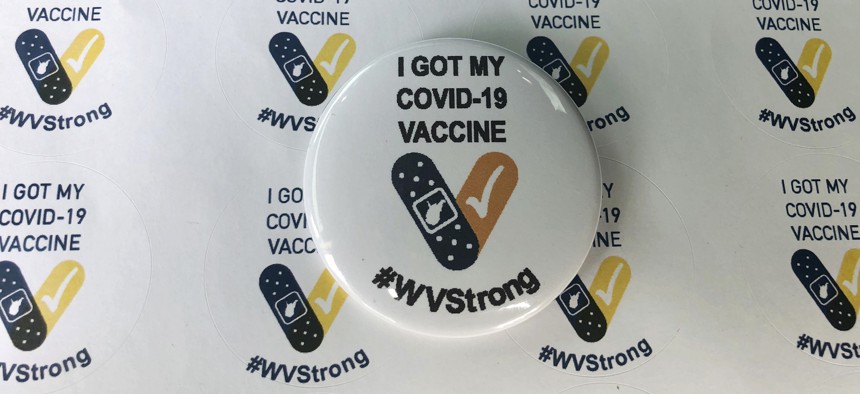Cash for Jabs? Officials Look to Cash Perks to Boost Vaccine Uptake

Stickers and a button given to people who receive their COVID-19 vaccines are displayed Thursday, Jan. 14, 2021, at the National Guard Armory in Charleston, W.Va. AP Photo/John Raby
West Virginia's governor announced a $100 incentive program this week. In Detroit, people can get a $50 debit card for driving someone to a vaccination site.
With Covid-19 vaccination rates slowing in the U.S., some state and local officials are turning to cash incentives as they look for ways to get more shots into arms.
West Virginia Gov. Jim Justice unveiled plans this week to give $100 savings bonds—or possibly $100 checks—to state residents ages 16 to 35 who get shots. The payments would even be retroactive for people vaccinated before the program was announced, he said.
Neighboring Kentucky is also considering a perk program, Gov. Andy Beshear said. Businesses are already offering vaccine incentives to people in the state ranging from cash, to doughnuts, to discounted sports tickets, according to local news reports.
In Detroit, the city will hand out $50 prepaid debit cards to residents who register for a program to drive other community members to select vaccination sites run by the city's health department. “There shouldn’t be a single barrier for any Detroiter to get a vaccination, and certainly not transportation,” Mayor Mike Duggan said in a statement.
People will receive $50 for each resident they shuttle in for a first shot and another $50 when they bring people back for their second doses. There is no limit on how many trips people can make in total, but there is a cap of three vaccine recipients per car.
Justice, in explaining his savings bond plan this week, noted the state spent between $19 million and $22 million during the past two months alone just on Covid-19 testing. Even if the savings bond incentive program the state is exploring was "fabulously successful," he said that it shouldn't end up costing much more than that.
The governor's office says that the plan is to use a portion of West Virginia's money from the CARES Act, the federal coronavirus relief law enacted last year, to pay for the initiative.
The return on investment from the incentive program if it works well, Justice said, "would be absolutely off the chart." He pointed out that the costs of not getting the pandemic under control cascade in all kinds of ways beyond just testing, like hospitalization expenses, along with the human toll of death and illness.
Daily Vaccinations Peaked Nationwide
U.S. Centers for Disease Control and Prevention data show that daily vaccinations nationwide hit a peak earlier in April and have since been falling. The seven-day rolling average for shots administered was around 3.2 million on April 11. By April 23 it had fallen to 2.5 million.
Throughout the national push to get more people vaccinated, hesitancy and skepticism toward the vaccines on the part of some Americans—for a variety of reasons—have been obstacles. Medical experts have warned that if vaccinations lag, it raises the risk that more contagious strains of the virus could take root, extending the pandemic.
The nation's seven-day moving average for new Covid-19 cases is generally down compared to mid-April and well below the surge over the winter. But the rolling seven-day average for daily deaths has been in the 600- to 700-person range for much of the month.
Justice, a Republican, recognized there are hurdles to his proposed program, such as securing the large number of bonds that could be necessary, ensuring that people can access them (this could require a special online account), and overcoming the fact that many young people aren't very familiar with Treasury bonds.
"We're still working through all the wickets, as far as, you know, how do we get the savings bonds," Justice said during a press conference on Wednesday. "You're either going to get the savings bond or you're going to get a $100 check from the state."
"At the end of the rainbow, we may have to just say 'nope, we can't do that, we're just going to send you a $100 check,'" he added.
West Virginia drew attention early after the vaccine became widely available for outpacing other states in getting doses to people. Data that the state's Department of Health and Human Resources updated on Friday shows 69% of state residents 65 and older are now fully vaccinated. For residents 16 and up the figure is 42%. Nationwide, about 30% of people in the U.S. are fully vaccinated.
Younger people in the state, under 35, are transmitting the virus faster than other age groups, according to the governor. "We're doing really not good on recruiting and getting additional people to the table to get their first shot," he added. "That's what we got to do."
Bill Lucia is a senior editor for Route Fifty and is based in Olympia, Washington.
NEXT STORY: Hackers Steal Washington, D.C. Police Files, Threaten to Release Data






